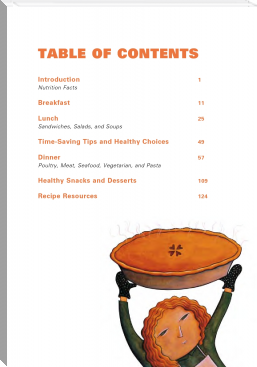The Italian Cook Book by Maria Gentile (e textbook reader TXT) 📕

- Author: Maria Gentile
- Performer: -
Book online «The Italian Cook Book by Maria Gentile (e textbook reader TXT) 📕». Author Maria Gentile
Serve the veal cold, in thin slices, with the sauce.
The stock of the veal can be rubbed through a sieve and used for risotto.
91 STUFFED ITALIAN SQUASH (Zucchini ripieni)For a description of the Zucchini see No. 32.
To make the stuffed zucchini first cut them lengthwise in two halves and remove the interior pulp, leaving space enough for the filling.
Take some lean veal (quantity in proportion to the squashes) cut it into pieces and place it on the fire in a saucepan with a hash of onion, parsley, celery, carrot, a little corned beef cut in little pieces, a little oil, salt and pepper. Stir it often with a spoon and when the meat is brown pour in a cup of water and then another after a while. Then rub the gravy through a sieve and put it aside.
Chop the cooked meat fine and grind it in the grinder and make a hash of it and one egg, a little grated cheese, a crumb of bread boiled in milk or in soup stock and just a taste of nutmeg. Put this hash inside each half squash and put them to brown in butter, completing the cooking with the gravy set aside.
92 STRING BEANS AND SQUASHES SAUTÉ (Fagiolini e zucchini sauté)Brown in butter some string beans, that have been previously half cooked in water and some raw squashes cut in cubes. Put the squashes in only when the butter is beginning to brown. Season moderately with salt and butter and add some brown stock or good tomato sauce.
93 STRING BEANS WITH EGG SAUCE (Fagiuolini in salsa d'uovo)Take less than a pound of string beans, cutting off the two points and removing all the strings, and then cook them partially in water moderately salted. Take them from the kettle, drain, and brown with butter, salt and pepper. Beat one yolk with a teaspoonful of flour and the juice of half a small lemon, dilute with half a cup of cold broth from which the fat has been removed and put this liquid on the fire in a small saucepan stirring continually. When the liquid has become, through the cooking, like a cream, pour it on the string beans that you will keep on the fire a little longer, with the sauce. The string beans so prepared can be served with boiled beef.
94 STRING BEANS IN MOLD (Sformato di fagiolini)Take one pound of string beans, seeing that they are quite tender. Cut off the ends and remove the strings. Throw them into boiling water with a pinch of salt and when they are half cooked take them away and put them in cold water. If you have brown stock complete the cooking with this and with butter, otherwise brown a piece of onion, some parsley, a piece of celery and olive oil. When the onion is browned put in the string beans and complete the cooking with a little water if necessary.
Prepare a Balsamella sauce (No. 54) with a small piece of butter, half a teaspoonful of flour and half a cup of milk. With this, a tablespoonful of grated cheese and four beaten eggs bind the string beans when they are cold, mix and put in a mold, evenly greased with butter and the bottom covered with paper. Cook in a double boiler and serve hot.
95 CAULIFLOWER IN MOLD (Sformato di cavolfiore)Take a good sized cauliflower, remove the stalk and outside leaves, half cook it in water and then cut it into small pieces. Salt them and put them to brown with a little piece of butter and then complete the cooking with a cup of milk. Then rub them through a sieve. Prepare a Balsamella (No. 54) and add it to the cauliflower with 3 beaten eggs and a tablespoonful of grated cheese.
Cook in a greased mold and serve hot.
96 ARTICHOKES IN MOLD (Sformato di carciofi)Remove the outside leaves of the artichokes, the harder part of all leaves, and clean the stalks without removing them.
Cut each artichoke into four parts and put them to boil in salt water for only five minutes. If left longer on the fire they become too soaked in water and lose their taste. Remove from the water, drain them, grind or pound and rub them through a sieve. Season the pulp so obtained with two or three beaten eggs, two or three tablespoonfuls of Balsamella (No. 54) grated cheese, salt and a taste of nutmeg, but taste the seasoning several times to see that it is correctly dosed.
Place in a mold with brown stock or meat gravy (in that case use a mold with a hole) and cook in double boiler.
97 FRIED MUSHROOMS (Funghi fritti)Choose middle-sized mushrooms, which are also of the right ripeness: when they are too big they are too soft and if small they are too hard.
Scrape the stems, wash them carefully but do not keep in water, for then they would lose their pleasant odor. Then cut them in rather large slices and dip them in flour before putting in the frying pan. Olive oil is best for frying mushrooms and the seasoning is composed exclusively of salt and pepper to be applied when they are frying. They can also be dipped in beaten eggs after being sprinkled with flour, but this is superfluous.
98 STEWED MUSHROOMS (Funghi in umido)For a stew the mushrooms ought to be below middle-size. Clean, wash and cut as for the preceding. Put a saucepan on the fire with olive oil, one or two cloves of oil and some mint leaves. When the oil begins to splutter, put the mushrooms in without dipping in flour, season with salt and pepper and when they are half cooked pour in some tomato sauce. Be sparing however, with the seasoning, in order that the mushrooms do not absorb it too much and so lose some of their own delicate flavor.
99 DRIED MUSHROOMS (Funghi secchi)Mushrooms are an excellent condiment of various dishes and for this reason it is well to have some always at hand. Since, however, it is not always possible to have them fresh, the following recipe to prepare dried mushrooms will be found useful.
First of all wait until there is a sunny day. Choose young mushrooms middle sized or big, but not too soft. Scrape the stem, clean them well in order to remove the earth and, without washing cut them in big pieces. This because when dried they diminish considerably in size. Keep these pieces exposed in the sun for two or three days, then thread them on a string (practising a hole in them) and keep in a well ventilated room or in the sun until they become quite dry. Then put them away well closed in a paper bag, but don't fail to look at them from time to time to see if it is necessary to expose them some more to sun and ventilation.
To use them soften in warm water, but keep them in as little as possible, so that they do not lose their delicate flavor. The best time to dry the mushrooms is June or July.
100 FRIED EGG-PLANTS (Melanzane fritte)Egg-plant or, as they are also called, mad-apples are an excellent vegetable which may be used as dressing or as a dish by itself. Small or middle-sized egg-plants are to be preferred, as the big ones have sometimes a slightly bitter taste.
Remove the skin, cut into cubes, salt and leave them in a plate for a few hours. Then wipe them to remove the juice that they have thrown out, dip in flour and fry in oil.
101 STEWED EGG-PLANTS (Melanzane in umido)Remove the skin, cut them into cubes and place on the fire with a piece of butter. When this is all absorbed, complete the cooking with tomato sauce (No. 12).
102 EGG-PLANTS IN THE OVEN (Melanzane al forno)Skin five or six egg-plants, cut them in round slices and salt them so that they throw out the water that they contain. After a few hours dip in flour and frying oil.
Take a fireproof vase or baking tin and place the slices in layers, with grated cheese between each layer, abundantly seasoned with tomato sauce (No. 12).
Beat one egg with a pinch of salt, a tablespoonful of tomato sauce, a teaspoonful of grated cheese and two of crumbs of bread, and cover the upper layer with this sauce. Put the vase in the oven and when the egg is coagulated, serve hot.
103 DRESSING OF CELERY (Sedano per contorno)The following are three ways to prepare celery to be served as seasoning or seasoning for meat dishes. For the first two make the pieces about four inches long, and two inches for the third. The stalk must be skinned, cut crosswise and left attached to the rib of the celery. Boil it in water moderately salted not over five minutes and remove dry.
1. Put the celery to brown in butter, then complete the cooking with brown stock (No. 13) and sprinkle with grated cheese when serving.
2. Put in saucepan a piece of butter and a hash made with ham and a middle sized onion, chopped fine. Add two cloves and make it boil. When the onion is browned add soup stock or hot water with bouillon cubes and complete the cooking. Then rub everything through a sieve and put the gravy in a plate with the celery, seasoning with pepper only, as the salt is already in the ham and serve with the gravy.
3. Dip the celery in flour and in the paste for frying (No. 58) and fry in fat or oil. Or else dip in flour and then in beaten egg, wrap in bread crumbs and fry.
104 ARTICHOKES WITH SAUCE (Carciofi in salsa)Remove the hard leaves of the artichokes, cut the points and skin the stalk. Divide each artichoke into four parts or six if they are big, and put them on the fire with butter in proportion, seasoning with salt and pepper. Shake the saucepan to turn them and when they have absorbed a good part of the melted butter, pour in some broth to complete the cooking. Remove them dry, and in the gravy that remains put a pinch of chopped parsley, one or two teaspoonfuls of cheese grated fine, lemon juice, more salt and pepper if needed, and, mixing the whole, make it simmer for a while. Then remove the sauce from the fire and add one or two yolks of egg, according to the quantity and put back on the fire with more broth to make the sauce loose. Put the artichokes in the sauce this second time to heat them and serve especially as a side-dish for boiled meat.
105 STUFFED ARTICHOKES (Carciofi ripieni)Cut the stalk at the base, remove the small outside leaves and wash the artichokes. Then cut the top and open the internal leaves so that you can cut the bottom with a small knife and remove the hairy part if it is there. Keep aside the small interior leaves to put them with the stuffing. This, if to be used, for example, for six artichokes, must be composed of the above small leaves, 1/8 lb. of ham more lean than fat, one fourth of a small onion, just a taste of garlic, some leaves of celery or parsley, a pinch of dry mushrooms, softened in water, a crumb of bread and a pinch of pepper, but no salt.
First chop the ham, then grind everything together and with the hash fill the artichokes, and put them to cook standing on their stalks





Comments (0)